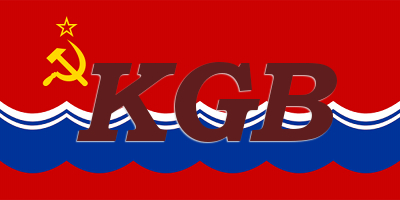He smiled and said that he knew what had happened in the army. “That's awful,” he sympathized, “trying to make you a criminal.”
The man didn't demand anything from me, didn't threaten me, nor order me to sign anything. He kindly suggested that if I wanted to pursue my studies, I should phone him and he'd see what could be done. It was very clear to me that they had tight control of my wellbeing and future. I was in deep trouble and knew they were going to capitalize on the situation.
As I left the Tartu KGB building I looked up and down Vanemuise street to check if anybody saw me and hurried away as fast as possible.
It was a serious dilemma as to what to decide. They're not going to leave me alone, that's for sure. Sooner or later I will be forced to become an agent. What'll I do. I couldn't talk to anybody about it. I had but one close friend. I told him. “Why play with fire”, he said. “Tell them to go to hell.”
I lost total self-confidence. I couldn't think straight. What happens if I tell the KGB to go to hell and don't phone them. They can find me anytime. What if one day I'm summoned to the dean's office and told I've been ejected from the university. No other place will accept me, none abroad. Not anywhere.
I envy people like Lagle Parek. They throw her in jail. It doesn't faze her. She doesn't show any fear. I would have gone insane sitting in a prison. I'm not that strong. I didn't want to lose my life. [Lagle Parek was convicted of anti-Soviet activity in the early 80s and sentenced to labour camp. Towards the end of the 80s, along with many others she was released. She helped found the first registered non-Communist political party in the USSR, the Estonian National Independence Party (ERSP) and became the first interior minister of a democratic independent Estonia.]
On occasion the KGB contacted me. Most often we met in a car. While we sat in a smoky Ziguli, usually parked between some grey buildings, the pale man frequently inquired about some university professor. Sometimes it seemed that he had a personal vendetta against professors. Perhaps he had received poor marks as a student. I replied that the professors under question were normal, nice people. Of the more well-known faculty members, journalism professor Marju Lauristin was a subject of interest to the KGB. [Marju Lauristin was the daughter of a communist leader Johannes Lauristin, who was one of Moscow's front men during the Soviet illegal military takeover of Estonia in 1940. The story is told that rather than being killed by German bombing while escaping the German invasion of Estonia in 1941 as the official version states, he was actually executed by his fellow communists for being a closet Estonian nationalist.]
Once in a while they inquired about fellow students with the intention of identifying which ones could be recruited as KGB agents. I didn't know what to say. They were all good guys.
The pale one even offered me money. Such a friendly gesture. He told me if I had any money problems to just let him know. I didn't want any money from him and I had no idea how much would have been offered.
Sometimes I was summoned to the Tartu Hotel. He told me the room number and was usually waiting for me before I arrived. He was always in suit and tie. No coffee was offered, just conversation.
I had been co-opted into spying for the KGB – a game for big boys with tiny intellects. The game was: We meet, I get the assignments and later provide something vague as answers. For financial security, I personally was interested about a possible full-time career as an agent. But this idea depressed, tortured and exhausted me.
I didn't see any light at the end of the tunnel. I didn't see Estonia gaining its freedom. To gain any sense of a normal life, for me it was necessary to be a snitch for the KGB! A hopeless situation!
I was totally depressed. I decided to leave Estonia. I discussed it with a friend. Which is safer? To leave by boat across the sea or by land through Karjala? [Karjala was a large, formerly Finnish territory that had been invaded and annexed by the Soviet Union during the Finnish-Soviet war, one of the history-making battlefronts of WWII. Soviet Karjala had a common border with Finland over which many attempts to escape the USSR were made, mostly unsuccessfully.]
I wrote my relative in Canada a very long letter. I told the whole story and asked for help. I explained that the KGB was demanding co-operation and I'm playing along, but I'm not really co-operating. I asked the relative if a woman could be found who'd marry me so that I could leave the USSR. I didn't send this letter through the mail. I asked an acquaintance, who often visited Finland to post it there. I don't know if the letter ever reached my relative, never having received an answer from Canada.
That was only the second time I had put down on paper anything about my involvement with the KGB. The first was my letter of ‘confession' and regret that I was forced to write while in the army. Soon after my Canadian relative died.
Summarized translation by Laas Leivat (To be continued.)
Laas Leivat




